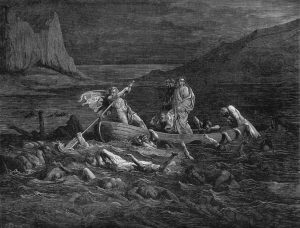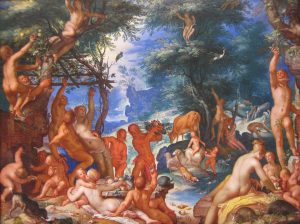Golden Age? What Golden Age, you might ask.
All things are relative. For decades, Irish research fumbled awkwardly around the great smoking crater that was the destruction of the PRO in 1922. Genealogists were viewed askance by Irish archives, and not without reason: one of my most vivid memories is of watching a colleague speed-search a box of original 1911 returns, creating a tiny blizzard of 80-year-old paper fragments in air around her. A few more speed-searches like that and there’d have been no 1911 left.

We were groping in the dark, finding the same nothing again and again. No wonder our hearts leapt when the first digitisations began – the old, deeply-flawed CD-ROM index to Griffith’s, the fuller Eneclann/National Library transcript, the early 1911 censuses for Dublin, Belfast and Kerry. (Why Kerry? Because the Minister for Arts at the time was from Kerry. Whatever made things happen.)
And then the dam burst: the Catholic registers, all the surviving censuses, and post-1858 wills, rootsireland’s collection going online and finally the mother-lode, the General Register Office’s birth, marriage and death collection at IrishGenealogy.ie. (See here for a rough list of what’s currently online.)

Four sources are almost universally relevant for Irish genealogy, the GRO records, the surviving censuses, the surviving church records and the two nineteenth-century tax surveys, Griffith’s and the Tithe Books. All four are now online, substantially complete and mostly free to search.
For a few years, it seemed like every six months brought another wonderful breakthrough. If those years were a Golden Age, it is certainly over. There’s plenty still to be done improving what’s there, and filling in what’s missing – Church of Ireland registers, estate papers, the Land Commission records and much more. But the big beasts have been slain.
It was a Golden Age that made our ancestors findable at last. Now all we have to do is actually find them.
Don’t be so sure its over John!
How about taking a look st the office of Deeds for us in Dublin? I have mine because a distant cousin looked it up. It gives the three generations on the farm leases. For some us, it’s a blessing.
After 15 years of searching, the new resources you mentioned finally allowed me to solve a old question for our family: Where did our O’Connors/Connors originate in Ireland. I’m still doing the happy dance! I blogged about my efforts and results: https://eejjennings.wordpress.com/
Thanks for your useful blog and website!
Ellen Jennings
Oh, I cannot agree that the Golden Age is over. I finally broke down and subscribed to FindMyPast to access the New York Archdiocese records. Hundreds of thousands of records were just added to the NY parish database. I have been hyperventilating with all my discoveries. They have other archdioceses too but my ancestors all came to NY from Ireland in the 1840s-50s. I really think people in Ireland and elsewhere should search more often in US records for family who left. It can answer a lot of questions–such as finding obits with places of origin. The NY records go back to the late 1700s. Sometimes you have to leave Ireland to find your Irish ancestors.
I’m hoping that all of those “Golden Age” Irish resources (for which I am so incredibly grateful) will help me locate details about my Irish ancestors in Galway, Clare and Kerry
Platinum age coming?
Massive-scale genome sequencing is almost certainly going to be a reality within the next years or decades. Indeed there is already a serious proposal to do full genome sequencing of about 10% of the Irish population. If these data were shared (big if!), that would allow us to build family trees going back many hundreds of years, though we’d have very little idea of who these distant ancestors actually were. As with traditional genealogy, once you know something about one member of a family, you know something about many more, so I expect some challenging discussions as to how to do all of this!
I still feel that the Golden Age is yet to come to Co Donegal. When you can find a Bridget Gallagher or Patrick Boyle or other common used name and have a reasonable chance of finding your correct ancestor.
There has been too many times when all the help in the world from Roots Ireland, GRO and all the Parish records in the county will still not be of help when you only have the 1901 & 1911 census to represent what was the a generation of one line of your ancestry.
So, when the day comes that a townland appears as place of birth on a census instead of Co Donegal or Ireland for all the Bridget & Patricks’ of Co Donegal, I will remain no further back than I am forward.
Is it difficult to find Quaker ancestors I did get some papers from the libarary library they were very helpful .The dismissal letters from 1779
I know it was my ancestor because of the address I also got another dismiss al for a widow called Mary Fairbrother the man was Abraham Fairbrother
Thanks again John for another clever post, and for link to everything available online! Very helpful.
Jan
The Land Commission Records: sitting in storage somewhere, just waiting…..and I have a strong feeling that there’s an army of people who would volunteer to sort and transcribe them, if the official will was there.
Making the 1926 census available online would re-ignite things! There was talk a few years ago of it being brought forward but it looks like we have to wait until 2026.
When will the GRO marriage and death records back to 1864 come online? That will make it easier to connect my famine emigrants to current Irish residents.
Here is an idea; as the Golden Age is over and the major sources have been digitised, how about the setting up of a Wikipedia style site which has all this put together. Starting from the 1901 and 1911 censuses, people could construct family trees, going backwards, linking church, civil records, land records, gravestone records, newspaper articles etc. I would suggest that these family trees are not brought up to date, that can be left to families or individuals to do themselves privately. Like Wikipedia you could have editors to check all is kosher. You might say that this is already being done on various pay sites but this would be as accessible as Wikipedia and easy to check back against original sources. People who have completed their own family tree could complete those of neighbours adding any information they have. I hope such a large undertaking would not cause the extinction of professional genealogists!
Various “One World Trees” such as WikiTree, Geni and FamilySearch FamilyTree do this already. Each of them has a goal of creating a single family tree for all humanity, containing all humans mentioned in genealogical records, and with each person having proper sources and citations. All of these sites can be accessed for free by anyone, though some advanced features on Geni require a subscription.
You are right, I haven’t come up with anything new, I hadn’t tried these before though and had a look at Geni; it looks to be that people are putting up material from their own families and it will probably be quite fragmented for a long time. My idea was to start one purely focused on Ireland and to have all material from the 1901 and 1911 censuses updated on the site; then details of the civil and church records could be added. So instead of people only putting all their own family material on it, the full basics would be populated and we could work from there. Ideally like Wikipedia there would be local editors checking that details are correct. Gradually different records could be added like gravestone inscriptions etc. An example from the census of 1901 was a cousin of my father present aged 7 but not in the whole country in 1911. I know he ended up as a doctor in a local town but where was he at age 17? I came across a brief transcript of a letter he wrote in 1913 to the head of the Irish College in Rome to say that he was having doubts about his vocation and he wouldn’t be going back, this kind of publicly accessible detail could be added to his entry; he had possibly been training for the priesthood in 1911 and was in Rome at the time. With this type of site even people who have no or few living relatives could be added and a part of their story put together.
You’d be luckier asking for World Peace.
The ‘Golden Age’ will have at least two phases, John. The second phase is discovering what we can learn from the records we’ve found, beyond the obvious. It’ll be less detective work, more scholarship, and (if we can believe it!) exponentially more fulfilling.
I hope that it’s not over. Donegal Catholic records too late for me. I guess I need rental records, if they exist. They’re not online.
Most of my family was COI and perhaps some Presbyterian and mostly in N. Ireland (and Monaghan). Especially in some areas, few COI records are available to us unable to go to Ireland.
I think for many with Catholic ancestry, particularly further east, it is a golden age. I just wish the COI or someone would digitize them and make them available outside of Ireland.
The age is still underway, and each year I hope that which I need is finally released. I might finally solve a few mysteries. Not every Irish family stayed in one place and then hopped the boat to wherever. Mine sure didn’t!
I’m holding out for land records to come online.
This research is addictive and I thank the good Lord for an understanding spouse! I have traced his grandparents’ roots and at last we will travel to Ireland and their counties this May. Unfortunately, I have no information about the maiden names of the grandmothers or the counties of origin of 4 sets of my great-grandparents born in Ireland! My dad said his grandparents came from Donegal but I have not one shred of documentation to support that. Ah, but, the thrill some of you have mentioned of searching and finding that one nugget that answers a long unsolved question like “who is that little blonde girl in all those photos with mom, who we only knew as ‘Patsy'”? After 2 years of searching, I know! I share the results with some of my 7 sibs, expecting a jubilant response of relief and satisfaction! Well, you know, they think that is….nice.